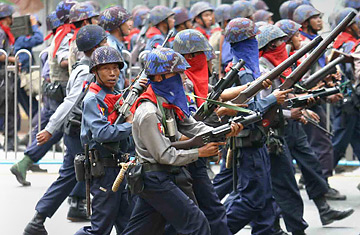
Armed Burmese security forces march down the streets of downtown Rangoon, Burma.
The rulers of the world's pariah states are usually recognizable personalities. Kim Jong Il with his electrified hairdo, Muammar Gaddafi with his aviator sunglasses, Mahmoud Ahmadinejad with his penchant for windbreakers. But Burma? No one dictator comes to mind, only a coterie of faceless generals — 12, to be exact. Last week, in the junta's latest wave of repression, soldiers fired on thousands of peaceful protesters who had dared challenge its iron-fisted rule. But the question remains: Who exactly controls Burma, one of the world's most isolated regimes?
For starters, Burma (also known as Myanmar) is ruled by one of the world's longest-standing military dictatorships. An army-led coup in 1962 initially brought men in uniform to power, first the charismatic and superstitious Ne Win, now his rather less magnetic successor Than Shwe. The generals took control not only of the armed forces but all aspects of politics and the economy as well. In the decades since the takeover, Burma has evolved into a nation where "the military is the state," according to Burmese historian Thant Myint-U. "Army officers do everything. Normal government had withered away."
The country's martial links began long before these two generals rose to power. Formerly a ragtag band of freedom fighters, the military helped Burma free itself from British colonialism. Aung San, the father of imprisoned Nobel Peace Prize laureate and democracy activist Aung San Suu Kyi, is revered both as an independence hero and as the founder of Burma's army. After independence in 1948, this group of rather beleaguered soldiers transformed itself into a professional force. A Defense Services Academy modeled after West Point opened its doors. The Defense Services Institute took over colonial-era business concerns like shipping and banking, padding army coffers. In a nation devastated by decades of war and the careless departure of empire, the military emerged as the only force organized and disciplined enough to take over the running of the country.
Burma's army also burnished its legitimacy in another way: It claimed to be the only force that could keep the country together. The nation is composed of more than 100 ethnicities, many of which waged wars and insurgencies against the central government for decades. Politicians, the generals asserted, represented feuding ethnic interests. In Burma's last election — back in 1990 — as many as 20 ethnically based political parties contested the polls. Who better than the military to keep peace between all these fractious tribal groups?
But since the heyday of independence, Burma's military has lost the love of its people. Coup leader Ne Win ruined one of Southeast Asia's most promising economies by nationalizing businesses and unveiling the disastrous "Burmese Way to Socialism." Paranoid about maintaining power above all else, the army has repeatedly turned its guns against its own people, most tragically in 1988 when a student-led protest movement was crushed, leaving some 3,000 dead. Even as the masses have grown poorer, the military has enriched itself through timber and natural-gas deals. In 2005, the ruling junta mysteriously moved the nation's capital from Rangoon to a new city called Naypyidaw, carved out of the jungle at a cost of hundreds of millions of dollars. Last year, a samizdat video of Than Shwe's daughter getting married made the rounds in Rangoon; Burmese were shocked by the number of jewels dripping from her body — and by wedding gifts valued at an estimated $50 million.
At the same time, the generals have expanded their influence by doubling the army's size in just two decades. Burma's fighting force is now 400,000 strong, making it one of the largest militaries per capita in the world. Any signs of internal dissent within the armed forces are quickly suppressed. General Khin Nyunt, the former head of military intelligence who was once hailed as a potential reformer for suggesting dialogue with democracy leader Suu Kyi, now languishes under house arrest on corruption charges. Dissident groups in neighboring Thailand are peopled with former army officers who had the temerity to suggest alternative ways to run the country. "Burma's military is a breed apart, and its biggest accomplishment is the sense of loyalty that it has bred," says Josef Silverstein, a Burma expert and retired professor at Rutgers University in New Jersey. "Few forces appear so unified."
But could there be cracks developing in the army's cohesion? During the lead-up to last week's brutal suppression of the Buddhist monk-led demonstrators, exile groups buzzed with speculation that the junta's No. 2, General Maung Aye, was opposing any violence. Then, army troops opened fire, killing at least 10 people in Rangoon. On Sunday, democracy advocates regained a modicum of hope when visiting United Nations Special Envoy Ibrahim Gambari was allowed to meet with Suu Kyi, whose National League for Democracy won elections in 1990 that the junta ignored. Exile websites wondered whether this meeting meant that more moderate officers were holding sway. Rumors also abounded that Than Shwe's family had fled the country. But Burma's military has ruled with an iron grip for 45 years and predicting its demise — or even nascent reform within its ranks — is a dangerous exercise. Burma's generals may be faceless, but their staying power has outstripped that of the world's far better known dictators.
